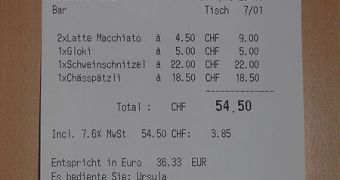A new system, developed by TransactionTree, promises to take paper receipts out of circulation, and to replace them with electronic counterparts. For those of you who feel that waiting in line for your printed copy of the receipt takes too long, this is nothing but good news. The company already announced that the system is compatible with most point-of-sale (POS) services, which means that the new method can be implemented on the existing infrastructure at fairly low costs.
For the average American, hanging on to the receipts can be a very cumbersome task, especially if many items have recently been bought. If you want to return something, and fail to find the receipt, you're stuck with that object. But with TransactionTree's new system your copy of the small paper reaches the inbox of your e-mail account directly, in less time than it takes for you to get home from the store.
[ADMARk=1]You, of course, have the possibility to create a special folder for all of them, and thus be sure you can find all proofs of buy whenever you need them. The good thing is that they can be accessed from everywhere, and also eliminate the need for you to assign an entire drawer to storing useless paper.
In addition to these direct advantages, the system is also environment-friendly, as it reduces massive orders on paper and ink. Producing sufficient amounts of wood for all the paper used in supermarkets and hypermarkets alone places a huge strain on forests, which are ransacked for the creation of printing paper that gets discarded approximately 1 minute after it served its purpose.
TransactionTree CEO and co-founder Jason Shapior explains that "Now more than ever, people are looking for the little things they can do during their day-to-day lives to help the environment, and choosing an electronic receipt is one simple way they can save our planet one transaction at a time."
Furthermore, the move will also benefit stores, which will significantly cut back on expenses related to buying paper, and reduce queue-waiting times, which means more sales. Even if a professional does it, changing the roll of paper in a cash register can take up to five minutes, which sums up to a long time in a large market, over the course of the day.
Stores can also analyze the trends of the market directly, and can identify most purchased items. Future trends of the markets could be estimated, and special offers created accordingly, which will benefit in the long run both the retailer and the shoppers. Direct marketing will also become possible, and the store adapting the new system can brag about how it leaves a smaller carbon footprint on the environment.

 14 DAY TRIAL //
14 DAY TRIAL //